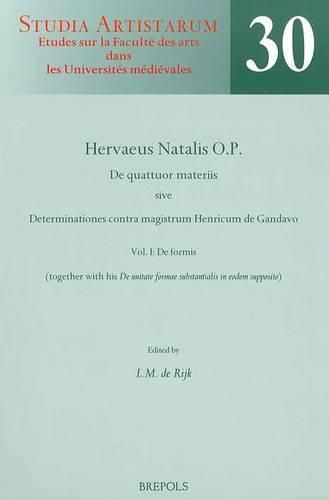Readings Newsletter
Become a Readings Member to make your shopping experience even easier.
Sign in or sign up for free!
You’re not far away from qualifying for FREE standard shipping within Australia
You’ve qualified for FREE standard shipping within Australia
The cart is loading…






The aim of the present edition of Harvey Nedellec’s De quattuor materiis is to make a collection of texts available that can throw some more light upon the ongoing debates around 1300 about some highly controversial issues, including the plurality of forms, the relationship between being and essence, the significance (or superfluity) of the intelligible species, and the intellect’s priority to the will. Harvey’s polemic interventions, which are explicitly directed against the ontological positions held by Henry of Ghent, are the more interesting as they are coloured by a manifest animosity against his opponent and the Ghentian way of doing philosophy in general. The author’s attitude is most prominent in the first tract of the collection presented in the first volume, De formis. In order to put the impact of this tract into a larger perspective, Harvey’s extensive treatise De unitate formae substantialis in eodem supposito has been added.
$9.00 standard shipping within Australia
FREE standard shipping within Australia for orders over $100.00
Express & International shipping calculated at checkout
The aim of the present edition of Harvey Nedellec’s De quattuor materiis is to make a collection of texts available that can throw some more light upon the ongoing debates around 1300 about some highly controversial issues, including the plurality of forms, the relationship between being and essence, the significance (or superfluity) of the intelligible species, and the intellect’s priority to the will. Harvey’s polemic interventions, which are explicitly directed against the ontological positions held by Henry of Ghent, are the more interesting as they are coloured by a manifest animosity against his opponent and the Ghentian way of doing philosophy in general. The author’s attitude is most prominent in the first tract of the collection presented in the first volume, De formis. In order to put the impact of this tract into a larger perspective, Harvey’s extensive treatise De unitate formae substantialis in eodem supposito has been added.